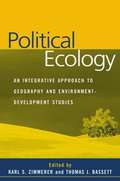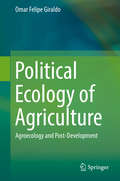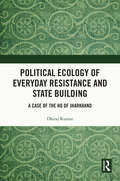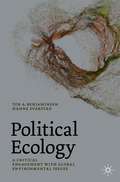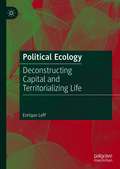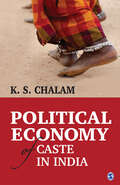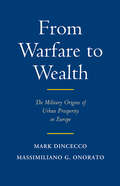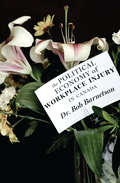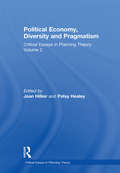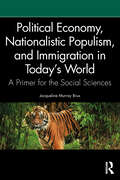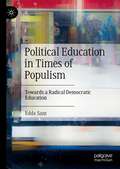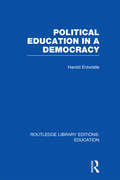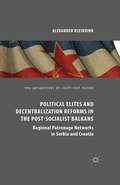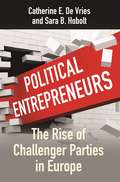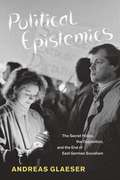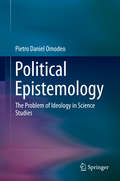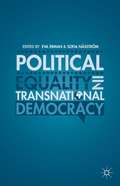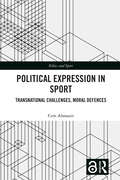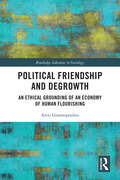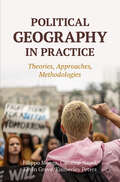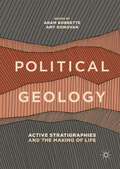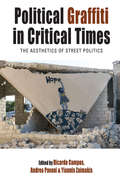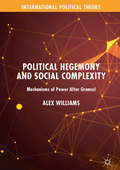- Table View
- List View
Political Ecology
by Karl Zimmerer Thomas J. BassettThis volume offers a unique, integrative perspective on the political and ecological processes shaping landscapes and resource use across the global North and South. Twelve carefully selected case studies demonstrate how contemporary geographical theories and methods can contribute to understanding key environment-and-development issues and working toward effective policies. Topics addressed include water and biodiversity resources, urban and national resource planning, scientific concepts of resource management, and ideas of nature and conservation in the context of globalization. Giving particular attention to evolving conceptions of nature-society interaction and geographical scale, an introduction and conclusion by the editors provide a clear analytical focus for the volume and summarize important developments and debates in the field.
Political Ecology of Agriculture: Agroecology and Post-Development
by Omar Felipe GiraldoThis study discusses an original proposal aimed at critically analyzing the power relations that exist in contemporary agriculture. The author endeavors herein to clarify some of the strategies that industrial agribusiness, in collusion with the state and multilateral structures, sets in motion in order to functionalize the lives of millions of farmers, so that their bodies, enunciations, and sensibilities can be repurposed in accordance with the dynamics of capital accumulation. The argument is based on the idea that agro-extractivism cannot be thought of exclusively as an economic-political and technological system, but as a complex interweaving of cultural meanings, aesthetics, and affections, which, amalgamated under the abstract name of "development", act as a support for the whole system's scaffolding. The book also explores the other side of the coin, describing how, and under what conditions, social movements are responding to the calamities generated by this model. The central thesis is that many ongoing agroecological processes are providing one of the most interesting guidelines at present for visualizing transitions towards post-development, post-extractivism, and the construction of multiple worlds beyond the sphere of capital. Political ecology of agriculture joins the calls that question the cultural project of modernity and the predatory sense imposed by the globalized food empire, and invites recognition of the importance of agroecology in the context of the end of the fossil-fuel era and the likely collapse of our industry-based civilization.
Political Ecology of Everyday Resistance and State Building: A Case of the Ho of Jharkhand
by Dhiraj KumarResource extraction and conflicts over natural resources are a global phenomenon, including in India. This book explores the process of state formation through developmental intervention in the resource-rich areas of Jharkhand in eastern India which are inhabited by the indigenous Ho community. The cultural practices and livelihoods of Indigenous tribes, like the Ho community in Jharkhand, are deeply linked with the local ecology. The conflict in Jharkhand is intertwined with state development projects and capitalist interventions. This book examines the history of these projects and the issues of territorialisation, dispossession, accumulation, and marginalization which communities have been fighting against for many decades. It examines the process of development policies and projects shaping and restructuring the resource-rich ecology in the region and addresses the interrelated issues of development-induced dispossession, resistance, ecological transformation, governance, illegalities, and state-building. It focuses on the questions: what do development projects bring to the Ho community; what induces them to resist and negotiate; and how state decentralization schemes and local governance in resource conflict areas strengthen State capacities? The book highlights the consequences on the livelihoods and cultural practices of the local people because of ecological transformation and everyday resistance. Comprehensive and important, this book will be of interest to students and researchers of anthropology, sociology, political ecology, social work, development studies, ecology, developmental sociology, indigenous studies, law, and economic anthropology.
Political Ecology: A Critical Engagement with Global Environmental Issues
by Tor A. Benjaminsen Hanne SvarstadThis textbook introduces political ecology as an interdisciplinary approach to critically examine land and environmental issues. Drawing on discourse and narrative analysis, Marxist political economy and insights from natural science, the book points at similarities, differences and inter-connections between environmental governance in the global North and South. A wide range of carefully curated case studies are presented, with a particular focus on Africa and Norway. Key themes of power, justice and environmental sustainability run through all chapters. The authors challenge established views and leading discourses and present research findings that may surprise readers. Chapters cover topics including wildlife conservation, climate change and conflicts, land grabbing, the effects of population growth on the environment, jihadism in the African Sahel, bioprospecting, feminist political ecology, and struggles around carbon mitigation within a fossil fuel-based economy. This introductory text provides tools and examples for both undergraduate and postgraduate students to better understand on-going struggles about some of the world’s most urgent challenges.
Political Ecology: Deconstructing Capital and Territorializing Life
by Enrique LeffThis book offers a conceptual framework for the critical understanding of the present socio-environmental conflicts. It reflects on the evolution of subject and thought, a shift in environmental thinking triggered by the development of eco-territorial conflicts and the social responses given to the environmental question. Bringing together 40 years of the authors writing and research, the book explores the transition from ecological economics and historical materialism to ecological Marxism. It unpacks the forging of political ecology from value theory in political economy, to ecological distribution and ecologies of difference; a transition to an environmental rationality grounded in the ontology of diversity, a politics of difference and an ethics of otherness. This evolution in thinking gives consistency to a theoretical discourse able to respond to the territorial conflicts generated by the radicalization of the environmental question as a key social issue of our times. The book is a call to respond to the urgent challenge of reversing the tendency towards the entropic death of the planet and to building a sustainable world order.
Political Economy of Caste in India
by K S ChalamPolitical Economy of Caste in India presents the caste mode of production as an important analytical tool to understand the socio-economic and political dynamics of India. The book looks at caste from the economic base and also links it with the superstructure that includes judiciary, untouchability practices, caste atrocities against Dalits, social exclusion and so on. It presents empirical studies to show that the social habits of discrimination and crimes against the marginalized communities prevail even in the 21st century to physically alienate them from mainstream opportunities and ensure involuntary supply of labour at lower wages. It articulates that the economic intensity of caste can be discerned through the caste mode of production. The study brings out the limitations of some of the Marxists’ understanding of caste. It also presents a distinct approach for comprehending caste and suggests that the human rights perspective is one of the ways to combat it.
Political Economy of Institutions and Decisions: The Military Origins of Urban Prosperity in Europe (Political Economy of Institutions and Decisions)
by Mark Dincecco Massimiliano Gaetano OnoratoThe economic rise of Europe over the past millennium represents a major human breakthrough. To explain this phenomenon, this book highlights a counterintuitive yet central feature of Europe's historical landscape: warfare. Historical warfare inflicted numerous costs on rural populations. Security was a traditional function of the city. To mitigate the high costs of conflict in the countryside, rural populations migrated to urban centers. Over time, the city's historical role as a safe harbor translated into local economic development through several channels, including urban political freedoms and human capital accumulation. To make this argument, the book performs a wide-ranging analysis of a novel quantitative database that spans more than one thousand years, from the fall of the Carolingian Empire to today. The book's study of urban Europe's historical path from warfare to wealth provides a new way to think about the process of long-run economic and political development.
Political Economy of Workplace Injury in Canada
by Bob BarnetsonWorkplace injuries are common, avoidable, and unacceptable. The Political Economy of Workplace Injury in Canada reveals how employers and governments engage in ineffective injury prevention efforts, intervening only when necessary to maintain the standard legitimacy. Dr. Bob Barnetson sheds light on this faulty system, highlighting the way in which employers create dangerous work environments yet pour billions of dollars into compensation and treatment. Examining this dynamic clarifies the way in which production costs are passed on to workers in the form of workplace injuries.
Political Economy, Diversity and Pragmatism: Critical Essays in Planning Theory: Volume 2 (Critical Essays in Planning Theory)
by Patsy HealeyPlanning Theory has a history of common debates about ideas and practices and is rooted in a critical concern for the 'improvement' of human and environmental well-being, particularly as pursued through interventions which seek to shape environmental conditions and place qualities. The second volume in this series covers in detail critical political economy, the turn to diversity and critical pragmatism. It provides an authoritative collection, in an accessible form, of the most important and influential articles and papers along with a detailed introduction by the editors. It offers a unique reference resource for planning scholars, upper-level undergraduate and post-graduate students.
Political Economy, Nationalistic Populism, and Immigration in Today's World: A Primer for the Social Sciences
by Jacqueline Murray BruxPolitical Economy, Nationalistic Populism, and Immigration in Today’s World: A Primer for the Social Sciences is a core text for a multidisciplinary range of courses in economics, political science, sociology, international studies, public policy, and the social sciences.The text weaves together an understanding of the interconnected topics of global nationalistic populism, authoritarianism, immigration, conditions in developing countries, social systems and safety nets, diversity, and ultimately, happiness as measured by global happiness surveys.The text is designed for a global audience through the use of examples and case studies in a manner that is clear to students and provides all prerequisite knowledge for undergraduates. It includes content on countries across the developing world, Europe, Canada, and the United States. There is considerable emphasis on the politics and ideologies of Europe and the United States and how these relate to immigration and impact each other.
Political Education in Times of Populism: Towards a Radical Democratic Education
by Edda Sant"In professional and academic contexts nothing is more important than helping people to understand and engage with democratic society. Sant has written an excellent book which helps greatly towards that end. She has developed incisive new arguments about the nature of contemporary politics and education. Using the most recent as well as classic literature, she explores key ideas and issues. Through wide ranging discussions and by referring to her own valuable empirical work she characterizes and creates thoughtful insights and innovative pedagogical approaches. This book achieves the very difficult task of illuminating complex ideas at the same time as helping to determine practical ways to achieve social justice through education. Political education has been neglected for too long. This book is a bold new step in its achievement."—Ian Davies, Emeritus Professor, University of York, UKThis book examines political education in times of democratic crisis, polarisation and uncertainty. Using populism as a diagnostic tool, the book scrutinises current democratic practices and considers alternatives for future social studies and citizenship education. The author examines contemporary events including Brexit, the Catalan referendum for independence and protests in Chile to ask how democratic educators can respond to times of crisis. Centered on themes of knowledge and ideology, the book draws together political philosophy and educational research to map out, critically analyse and offer alternatives to dominant debates on political education. It will be of interest and value to scholars examining the relationship between democracy and educational theory and practice.Edda Sant is Senior Lecturer at Manchester Metropolitan University, UK. A former social studies teacher, her research interests lie in citizenship, political and democratic education. She has published widely in this field, and in 2016 was recognized with a Children’s Identity & Citizenship European Association Award.
Political Education in a Democracy (Routledge Library Editions: Education)
by Harold EntwistleIn this volume the author analyzes the relationships of concepts such as socialization and political education, explains those aspects of the theory and practice of democracy that are especially relevant for schools, and suggests ways in which teachers can better provide for the political education of their students.
Political Elites and Decentralization Reforms in the Post-Socialist Balkans: Regional Patronage Networks in Serbia and Croatia (New Perspectives on South-East Europe)
by Alexander KleibrinkAcross the globe, more powers are being devolved to local and regional levels of government. This book provides an innovative analysis of such decentralisation in transition states in the Balkans. Using new and rich data, it shows how political elites use decentralisation strategically to ensure their access to state resources.
Political Emotions
by Martha C. NussbaumHow can we achieve and sustain a "decent" liberal society, one that aspires to justice and equal opportunity for all and inspires individuals to sacrifice for the common good? In this book, a continuation of her explorations of emotions and the nature of social justice, Martha Nussbaum makes the case for love. Amid the fears, resentments, and competitive concerns that are endemic even to good societies, public emotions rooted in love--in intense attachments to things outside our control--can foster commitment to shared goals and keep at bay the forces of disgust and envy. Great democratic leaders, including Abraham Lincoln, Mohandas Gandhi, and Martin Luther King Jr. , have understood the importance of cultivating emotions. But people attached to liberalism sometimes assume that a theory of public sentiments would run afoul of commitments to freedom and autonomy. Calling into question this perspective, Nussbaum investigates historical proposals for a public "civil religion" or "religion of humanity" by Jean-Jacques Rousseau, Auguste Comte, John Stuart Mill, and Rabindranath Tagore. She offers an account of how a decent society can use resources inherent in human psychology, while limiting the damage done by the darker side of our personalities. And finally she explores the cultivation of emotions that support justice in examples drawn from literature, song, political rhetoric, festivals, memorials, and even the design of public parks. "Love is what gives respect for humanity its life," Nussbaum writes, "making it more than a shell. " Political Emotions is a challenging and ambitious contribution to political philosophy.
Political Entrepreneurs: The Rise of Challenger Parties in Europe
by Catherine E. Vries Sara B. HoboltHow challenger parties, acting as political entrepreneurs, are changing European democraciesChallenger parties are on the rise in Europe, exemplified by the likes of Podemos in Spain, the National Rally in France, the Alternative for Germany, or the Brexit Party in Great Britain. Like disruptive entrepreneurs, these parties offer new policies and defy the dominance of established party brands. In the face of these challenges and a more volatile electorate, mainstream parties are losing their grip on power. In this book, Catherine De Vries and Sara Hobolt explore why some challenger parties are so successful and what mainstream parties can do to confront these political entrepreneurs.Drawing analogies with how firms compete, De Vries and Hobolt demonstrate that political change is as much about the ability of challenger parties to innovate as it is about the inability of dominant parties to respond. Challenger parties employ two types of innovation to break established party dominance: they mobilize new issues, such as immigration, the environment, and Euroscepticism, and they employ antiestablishment rhetoric to undermine mainstream party appeal. Unencumbered by government experience, challenger parties adapt more quickly to shifting voter tastes and harness voter disenchantment. Delving into strategies of dominance versus innovation, the authors explain why European party systems have remained stable for decades, but also why they are now increasingly under strain.As challenger parties continue to seek to disrupt the existing order, Political Entrepreneurs shows that their ascendency fundamentally alters government stability and democratic politics.
Political Epistemics: The Secret Police, the Opposition, and the End of East German Socialism (Chicago Studies in Practices of Meaning)
by Andreas GlaeserWhat does the durability of political institutions have to do with how actors form knowledge about them? Andreas Glaeser investigates this question in the context of a fascinating historical case: socialist East Germany’s unexpected self-dissolution in 1989. His analysis builds on extensive in-depth interviews with former secret police officers and the dissidents they tried to control as well as research into the documents both groups produced. In particular, Glaeser analyzes how these two opposing factions’ understanding of the socialist project came to change in response to countless everyday experiences. These investigations culminate in answers to two questions: why did the officers not defend socialism by force? And how was the formation of dissident understandings possible in a state that monopolized mass communication and group formation? He also explores why the Stasi, although always well informed about dissident activities, never developed a realistic understanding of the phenomenon of dissidence. Out of this ambitious study, Glaeser extracts two distinct lines of thought. On the one hand he offers an epistemic account of socialism’s failure that differs markedly from existing explanations. On the other hand he develops a theory—a sociology of understanding—that shows us how knowledge can appear validated while it is at the same time completely misleading.
Political Epistemology: The Problem of Ideology in Science Studies
by Pietro Daniel OmodeoThis book is an investigation of the ideological dimensions of the disciplinary discourses on science in line with the scholarly tradition of historical epistemology. It offers a programmatic treatment of the political-epistemological problematic along three entangled lines of inquiry: socio-historical, epistemological and historiographical. The book aims for a meta-level integration of the existing scholarship on the social and cultural history of science in order to consider the ways in which struggles for hegemony have constantly informed scientific discourses. This problematic is of primary relevance for scholars in Science Studies, philosophers, historians and sociologists of science, but would also be relevant for anybody interested in scientific culture and political theory.
Political Equality In Transnational Democracy
by Eva Erman Sofia NäsströmThis book is about the status of political equality under global political conditions. If political equality generally is considered a core feature of democracy, it has received little attention among theorists concerned with global governance. Given the enormous emphasis on democracy as legitimizing factor in global politics, this neglect is noteworthy. This book sets out to address what accounts for the neglect, on the one hand, and how it may be remedied, on the other. The overall aim is to revitalize the debate on the status of political equality in transnational democracy.
Political Expression in Sport: Transnational Challenges, Moral Defences (Ethics and Sport)
by Cem AbanazirThis powerful new book looks at how private institutions governing and organising sport restrict political expression. Uniquely, it makes a case for the freedom of expression for athletes, spectators and audiences built upon philosophical foundations. In the era of Colin Kaepernick and taking a knee, politics and protest in sport have never been more visible and immediate. Drawing on a wide range of international cases, including protest actions from athletes such as Tommie Smith and John Carlos, Naomi Osaka and Feyisa Lilesa, as well as the reactions from sport organisations including the IOC, FIFA, UEFA and the NFL, the book argues that the organisation of sport at the hands of associations and leagues and their transnational power to regulate, adjudicate and enforce matters according to their interests lead to the restriction of freedom of expression. Focusing on the individual, the book presents a framework for the defence of freedom of expression in sport on moral grounds and also explores the limits to freedom of expression, especially those arising from hate speech, that might better serve both the individual and sport as an institution. This book is fascinating reading for anybody with an interest in the ethics, philosophy or politics of sport, sport governance, the relationship between sport and wider society, or moral or political philosophy.
Political Friendship and Degrowth: An Ethical Grounding of an Economy of Human Flourishing (Routledge Advances in Sociology)
by Areti GiannopoulouDeveloping a contemporary account of political friendship and synthesizing it with the radical movement of degrowth, this book provides the ethical grounding and the rationale of an alternative economy which serves human flourishing. The Aristotelian political friendship embodies active concern for the others’ well-being that contemporary societies lack; the crucial problems of ecological destruction and global poverty illustrate this friendship deficit. Arguing for the need for re-embracing a friendly civic ethos and re-aligning the economy with moral objectives, the author updates the Aristotelian idea and identifies it with democratic-autonomous political-economic praxis that ensures citizens’ self-actualization. Degrowth movement questioning economic growth and productivism, and privileging a simpler life with less material goods, favours political friendship precisely because it nourishes its unconscious substratum namely human instinctual sociality. The call for genuine democratic political praxis that political friendship implies could enable the degrowth movement to retain its radical character and accomplish the shift to an economy which serves life. The book is worthwhile studying by students and researchers across social sciences and especially by scholars in the fields of sociology, philosophy, and politics, but also a broader readership sensitive to the issues of social and environmental sustainability will find this work extremely interesting.
Political Geography in Practice: Theories, Approaches, Methodologies
by Kimberley Peters Caroline Nagel Kevin Grove Filippo MengaThis innovative textbook on the theories, approaches and methodologies that inform political geography is brought together by past and present editors of the journal of the same name. The book fills the current gap in the literature through a reflection on the ‘doing’ of political geography: its very practice. The book includes chapters authored by leading and emerging voices in the field and covers themes to guide students across various degree levels, as well as university staff and faculty, in a logical and practical manner. The textbook allows students to develop critical thinking and reflect on important aspects of the practice of the sub-discipline. It presents how theories, approaches and methodologies are adopted by researchers in practice, equipping political geographers at all stages to develop their own individual research projects. Download the SN More Media app for free, scan a link with play button and access audio directly on your smartphone or tablet.
Political Geology: Active Stratigraphies And The Making Of Life
by Adam Bobbette Amy DonovanThis book explores the emerging field of political geology, an area of study dedicated to understanding the cross-sections between geology and politics. It considers how geological forces such as earthquakes, volcanoes, and unstable ground are political forces and how political forces have an impact on the earth. Together the authors seek to understand how the geos has been known, spoken for, captured, controlled and represented while creating the active underlying strata for producing worlds. This comprehensive collection covers a variety of interdisciplinary topics including the history of the geological sciences, non-Western theories of geology, the origin of the earth, and the relationship between humans and nature. It includes chapters that re-think the earth’s ‘geostory’ as well as case studies on the politics of earthquakes in Mexico city, shamans on an Indonesian volcano, geologists at Oxford, and eroding islands in Japan. In each case political geology is attentive to the encounters between political projects and the generative geological materials that are enlisted and often slip, liquefy or erode away. This book will be of great interest to scholars and practitioners across the political and geographical sciences, as well as to philosophers of science, anthropologists and sociologists more broadly.
Political Graffiti in Critical Times: The Aesthetics of Street Politics (Protest, Culture & Society #28)
by Ricardo Campos, Andrea Pavoni Yiannis ZaimakisWhether aesthetically or politically inspired, graffiti is among the oldest forms of expression in human history, one that becomes especially significant during periods of social and political upheaval. With a particular focus on the demographic, ecological, and economic crises of today, this volume provides a wide-ranging exploration of urban space and visual protest. Assembling case studies that cover topics such as gentrification in Cyprus, the convulsions of post-independence East Timor, and opposition to Donald Trump in the American capital, it reveals the diverse ways in which street artists challenge existing social orders and reimagine urban landscapes.
Political Graffiti in Critical Times: The Aesthetics of Street Politics (Protest, Culture & Society #28)
by Ricardo Campos, Andrea Pavoni Yiannis ZaimakisWhether aesthetically or politically inspired, graffiti is among the oldest forms of expression in human history, one that becomes especially significant during periods of social and political upheaval. With a particular focus on the demographic, ecological, and economic crises of today, this volume provides a wide-ranging exploration of urban space and visual protest. Assembling case studies that cover topics such as gentrification in Cyprus, the convulsions of post-independence East Timor, and opposition to Donald Trump in the American capital, it reveals the diverse ways in which street artists challenge existing social orders and reimagine urban landscapes.
Political Hegemony and Social Complexity: Mechanisms of Power After Gramsci (International Political Theory)
by Alex WilliamsHow can we understand power in a world of ever-growing complexity? This book proposes that we can do so by rethinking the theory and practice of political hegemony through the resources of complexity theory. Taking Gramsci’s understanding of hegemony as its starting point, the book argues that the intricacies of contemporary power can be mapped by applying concepts drawn from complexity theory, such as emergence, self-organisation, metastability, and generative entrenchment. It develops an original account of social complexity, drawing upon critical realist sociology, analytic philosophy of science, Marxist and continental philosophies, and neoliberal and anarchist thought. It then draws out the elements of Gramscian hegemony that already align with complexity concepts, such as the balance of forces, common sense, and the historic bloc. On this basis, the book sets out the different dimensions of complex hegemonic power before using this theory to interpret the nature of the power of neoliberalism since 2008.
